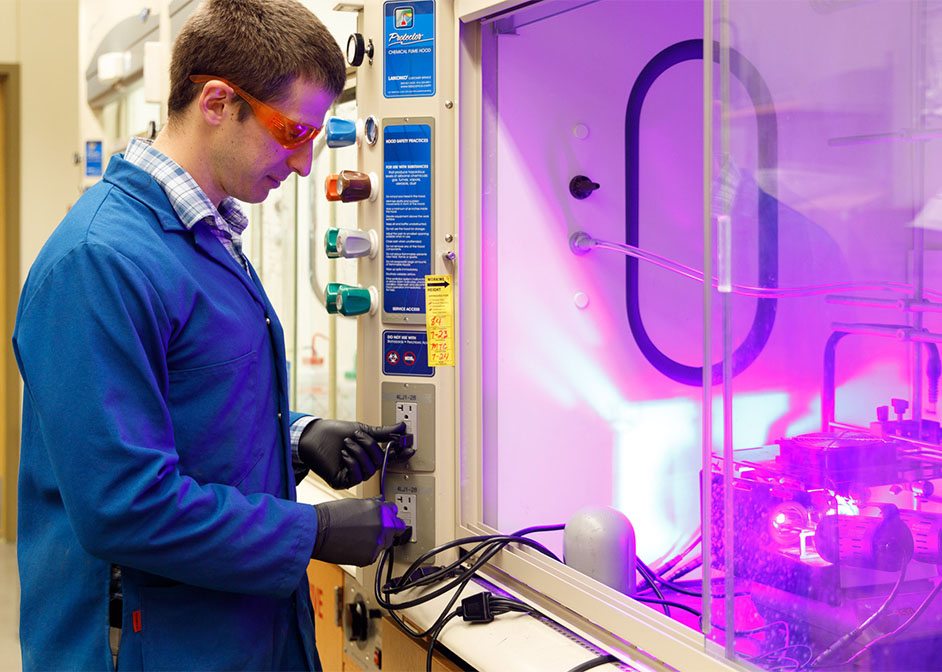Robert Comito Finding Ways to Create Environmentally Safe Plastics
The stakes are higher than ever in the quest for eco-friendly alternatives.
Robert Comito, assistant professor in the Department of Chemistry at the University of Houston, is pioneering an approach to create biodegradable plastics.

Comito, who is on the faculty at UH’s College of Natural Sciences and Mathematics, now has the support of a five-year, $732,168 CAREER Award from the National Science Foundation. The award will support Comito’s development of a novel platform of catalysts that can efficiently produce environmentally friendly materials.
“The award gives our lab much more credibility and a larger share of funding to support our work,” said Comito.
Synthesis of Biodegradable Polymers
Comito, a synthetic chemist, is working on a project that is focused on synthesis for the purpose of creating better ways of making biodegradable and biocompatible polymers.
“Synthesis, in the context of chemistry, is using a chemical reaction that makes something,” said Comito. “My team and I study catalysts that offer improved selectivity and control over the structure of the polymer.”
Studies by Comito and his team are focused on finding new catalysts that can be tuned to prepare biodegradable polymers with novel structures, new physical properties, and improved performance.
“With this information, we can explore properties of biodegradable polymers,” said Comito.
Exploring Efficient Ways to Make Safer Plastics
Petrochemical polymers are not biodegradable, nor are they naturally sourced from plants or plant-based materials. However, they are much cheaper to manufacture and are easily mass-produced.
“The problem is trying to make a biodegradable plastic that has the properties of petrochemical-based polymers,” said Comito. “It’s a synthetic problem because you have to make new polymers and test their properties before finding a replacement.”
Comito is working to change this process by making it more environmentally safe.
The CAREER Award supports Comito’s efforts to develop bimetallic catalysts for the synthesis of biodegradable polymers. A bimetallic catalyst contains two metals that cooperate, each serving complementary roles for a reaction that is faster and more selective than one with a single metal.
The process can be compared to eating with a fork and knife. One metal site holds the growing polymer chain while the other modifies its structure. In Comito’s case, the end result is a process that produces plastics that are not only better for the planet but can also be used in biomedical devices or in bioresorbable sutures.
“The types of catalysts we’re interested in are composed of metals that are connected to ligands,” said Comito. “A ligand is something that grabs the metal and controls its structure and reactivity.”
Additionally, Comito’s work could lead to advancements for processes that produce medical implants. Other improvements could apply to the production of compostable plastics, including cutlery, packaging materials and composting bags.
Preparing Students for the Future
Support from this grant will allow Comito to use his research to train a diverse group of students in organometallic chemistry, catalysis and polymer synthesis.
“My research program is focused on the inclusion of undergraduates, first-generation scholars and underrepresented students in STEM,” said Comito.
Comito is also creating drag and drop materials with problems that are different from traditional multiple-choice tests. “Students are given a digital artboard that enables them to rearrange objects to generate a response,” said Comito. “They use this to also generate diagrams that address the concepts we’re trying to teach. These materials are readily available for all students.”
As a result of his efforts, Comito also received the UH Teaching Innovation Program Grant for his efforts in digital learning during the pandemic.
- Chris Guillory, College of Natural Sciences and Mathematics